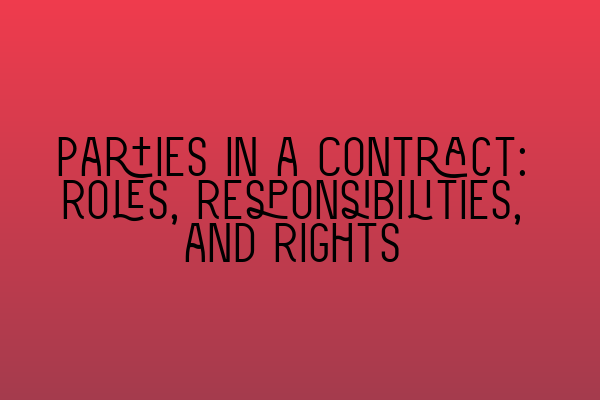Parties in a Contract: Roles, Responsibilities, and Rights
In contract law, parties play crucial roles that define their responsibilities, rights, and obligations. Understanding these roles is essential for both solicitors and individuals involved in contract negotiations. Whether you’re a legal professional or someone seeking clarity on this topic, this blog post will provide you with comprehensive insights into the parties in a contract and their respective roles.
Let’s dive right in!
1. The Offeror:
The offeror is the party who initiates the contract by making an offer. This party presents the terms, conditions, and consideration to the offeree. It is important for the offeror to ensure that the offer is clear, definite, and communicated to the offeree properly. The offeror has the power to revoke the offer before it is accepted by the offeree.
2. The Offeree:
The offeree is the party to whom the offer is made. They have the option to accept or reject the offer. If the offeree accepts the offer, it leads to the formation of a valid contract. It is important for the offeree to understand the terms of the offer before accepting it. They also have the ability to counteroffer, which creates a new offer for the original offeror to consider.
3. Intention to Create Legal Relations:
For a contract to be valid, there must be an intention to create legal relations between the parties involved. Both the offeror and the offeree must understand that the agreement is legally binding and enforceable. This intention may vary depending on the nature of the contract and the relationship between the parties.
4. Consideration:
Consideration refers to something of value that is exchanged between the parties in a contract. It can be in the form of money, goods, services, or a mutual promise to do or not to do something. Consideration is necessary to make the contract legally enforceable. Without the exchange of consideration, the contract may be considered void or unenforceable.
5. Capacity:
Each party in a contract must have the legal capacity to enter into the agreement. This means they must have the legal ability to understand the terms of the contract and the consequences of their actions. Minors, mentally incapacitated individuals, and individuals under the influence of drugs or alcohol may lack the capacity to contract.
6. Good Faith:
Parties in a contract have a duty to act in good faith. This means they must deal honestly and fairly with each other during the negotiation and performance of the contract. Acting in good faith helps to maintain trust and ensures the contract is carried out as intended by the parties.
7. Rights and Remedies:
The parties in a contract have certain rights and remedies available to them if the other party fails to fulfill their obligations. These rights and remedies may include damages, specific performance, or termination of the contract. It is essential for parties to be aware of their rights and the available remedies in case of a breach of contract.
To summarize, parties in a contract have distinct roles, responsibilities, and rights. Understanding these aspects is crucial for both solicitors navigating the legal landscape and individuals involved in contract negotiations. By considering the roles of the offeror and offeree, the intention to create legal relations, consideration, capacity, acting in good faith, and the rights and remedies available, parties can effectively negotiate, draft, and enforce contracts.
If you’re preparing for the SQE exam and need additional practice, check out our SQE 1 Practice Exam Questions and SQE 1 Practice Mocks FLK1 FLK2. For comprehensive preparation courses for SQE 1 and SQE 2, visit our SQE 1 Preparation Courses and SQE 2 Preparation Courses pages. Stay updated with the SRA SQE Exam Dates to plan your study schedule effectively.
Remember, contracts form the foundation of legal relationships, and understanding the roles, responsibilities, and rights of parties involved is essential for successful outcomes.
Disclaimer: This blog post provides general information only and does not constitute legal advice. Please consult a solicitor or legal professional for specific advice related to your situation.
